
An outbreak of norovirus at a festival in southwest Germany has impacted more than 800 individuals. The illness spread among attendees in a marquee at the Stuttgart spring festival last weekend. While the exact origin of the virus remains unclear, the extent of the infection has escalated over the week.
Authorities in Stuttgart have ruled out food or beverages served in the festival tent as the source of the outbreak, as tests on samples have returned negative results. The city’s health department conducted tests on marquee staff, utensils, and water used for washing, all of which came back negative. Instead, officials suspect that the virus was transmitted from person to person, possibly through the air, although whether the initial carrier was a visitor or an employee remains uncertain.Symptoms such as vomiting, nausea, and diarrhea were swiftly reported by festival-goers. By Friday afternoon, health officials in Stuttgart confirmed that the number of affected individuals had risen to 815.The spring festival, situated on the banks of the Neckar river, commenced last Saturday and is scheduled to run for 23 days. It features various rides, stalls, snack bars, and marquees offering entertainment and refreshments, drawing 1.4 million visitors last year.The outbreak has been traced back to the Göckelesmaier marquee, operated by Karl Maier, who speculated that an infected individual may have introduced the norovirus to the venue on Saturday evening, possibly as part of a group.Health officials in Stuttgart maintain that there is no evidence of hygiene violations. Following the outbreak, the Göckelesmaier marquee underwent thorough disinfection and has since resumed operations.City spokesman Sven Matis revealed to public broadcaster SWR that there are indications that the virus spread within the central serving area of the marquee before disseminating throughout the entire tent.Most individuals fell ill after visiting the marquee, and some of those affected were employees working at the time. Authorities have suggested that secondary infections might have occurred as infected visitors passed on the virus.
Picture Courtesy: Google/images are subject to copyright



